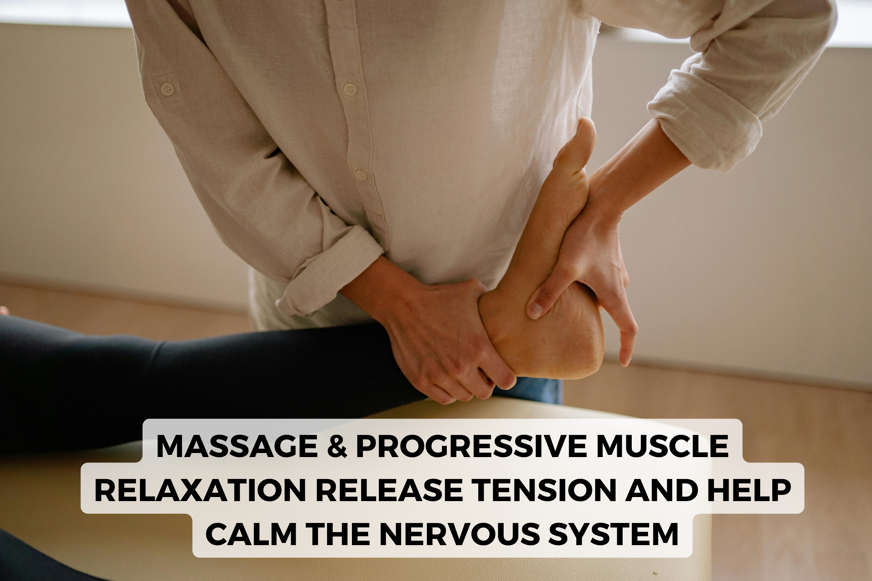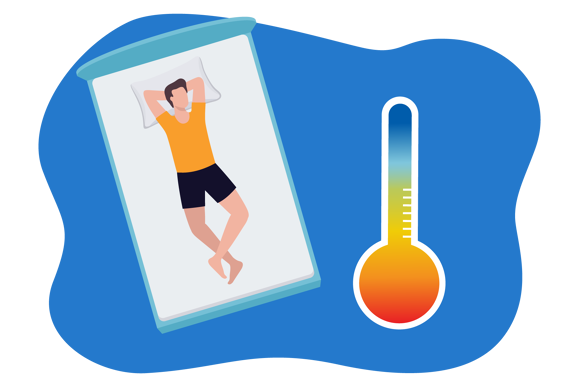How to fall back asleep after waking up in the middle of the night
Waking up in the middle of the night is more common than you might think, so don’t worry if this happens to you!
Here are some expert-recommended strategies to help you fall back asleep after waking up:
1. Practise deep breathing
Deep breathing exercises can calm your mind and body, making it easier to drift off again.
Breathe in through your nose for a count of six, hold for another count of six, and slowly exhale through your mouth for a final count of six.
This technique helps relax your nervous system [1] and encourages sleep.
2. Use relaxation techniques
Progressive muscle relaxation can be particularly effective.

Tense each muscle group for five seconds, then slowly release, starting with your toes and working up to your head.
3. Listen to guided meditations, sleep stories, or soft music
Listening to guided meditations or calming sleep stories can refocus your thoughts and promote relaxation.
There are plenty of meditation apps offering sleep-specific resources. 🎧
Gentle music or white noise can also create a soothing atmosphere [2], masking disruptive noises and helping you relax.
4. Journal your thoughts
If worries are keeping you awake, jot them down in a notebook by your bed.
This habit can help clear your mind and reduce anxiety about unresolved issues.
5. Visualise a peaceful scene
Instead of stressing about sleeplessness, imagine a tranquil scene like a quiet beach or serene forest.

This visualisation technique can calm your mind and encourage sleep.
A quick note on sleep hygiene
Working on your general sleep hygiene will work wonders in keeping you fast asleep.
We discuss this at length in our sleep hygiene guide, but two key takeaways are sticking to a consistent sleep schedule and focusing on a relaxing bedtime routine.
Can’t fall back asleep? Here’s what not to do!
Certain habits can make it harder to fall back asleep after waking up.
Avoid these common pitfalls:
- Watching the clock: Constantly checking the time can increase anxiety and make relaxation more difficult. Keep your clock out of sight or resist the urge to look at it altogether.
- Using electronic devices: The blue light [3] emitted by phones, tablets, and laptops disrupts your circadian rhythm, signalling your brain to stay alert. If you need to do something, opt for reading a physical book under soft lighting instead.
- Staying in bed too long: If you can’t fall back asleep within 15 to 20 minutes, get up and do something calming in another room. This prevents you from associating your bed with insomnia and reinforces it as a place for rest.
In our guide on how to fall asleep fast, we also talk about paradoxical intent - sometimes, by telling yourself to stay awake, you may even create the opposite effect and fall asleep again.
Why do we wake up in the middle of the night?
There are multiple reasons you may be waking up in the middle of the night, often categorised as environmental, health-related, lifestyle, or psychological factors.
Let’s take a closer look:
1. Environmental factors
- Noise and light: External sounds (like traffic or a partner’s snoring) and exposure to electronic device lights can disrupt sleep [4].
- Room temperature: Being too hot or too cold can lead to frequent awakenings [5].
2. Health issues
- Sleep disorders: Conditions like sleep apnoea interrupt breathing, causing repeated wake-ups.
- Hormonal changes: Pregnancy, menopause, or other hormonal shifts can alter sleep patterns.
- Ageing: Sleep tends to become lighter and more fragmented with age.
3. Lifestyle factors
- Diet and stimulants: Consuming alcohol, caffeine, or heavy meals close to bedtime can interfere with sleep quality.
- Physical activity: A lack of exercise or exercising too close to bedtime can affect how well you rest.
4. Psychological factors
- Stress and anxiety: High levels of stress or intrusive thoughts often lead to night-time awakenings.
- Depression: This is frequently linked to poor sleep patterns and regular interruptions.
By managing your overall sleep hygiene, you should be able to sleep through the night better.
When should you seek medical help for night-time awakenings?
If waking up during the night becomes a frequent issue and persists despite improving your sleep habits, it’s important to consult a doctor.
Consider seeking medical advice if you experience:
- Sleep disturbances lasting over four weeks
- Excessive daytime sleepiness
- Gasping or difficulty breathing during sleep
- Loud and chronic snoring
- Sudden episodes of falling asleep
- Uncomfortable sensations in your legs when trying to sleep
- Physical pain that disrupts your rest
Please remember that we are not medical professionals and our articles are for informational purposes only, so always consult your GP or healthcare professional for advice if you suspect underlying issues.
Final thoughts on how to fall back asleep after waking up
Waking up at night can be frustrating, but simple changes like relaxation techniques and avoiding electronics can help.
But if the issue persists or is accompanied by other symptoms, consult a healthcare professional.
With the right steps, you can enjoy better sleep and wake up refreshed.












Alternatively, message us directly via the Contact Us page.